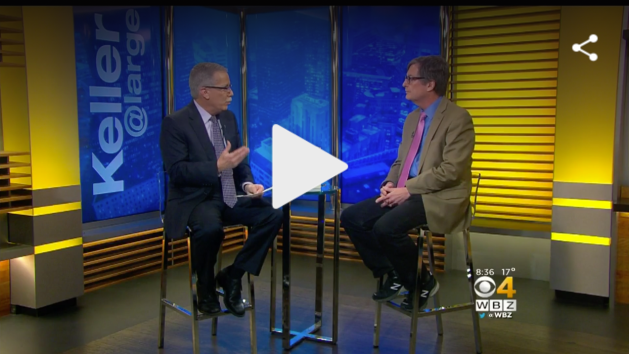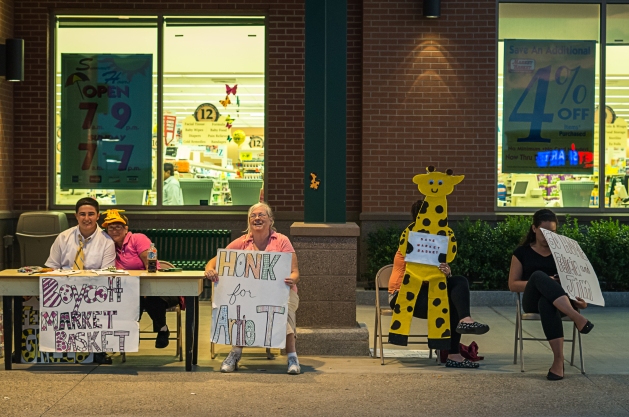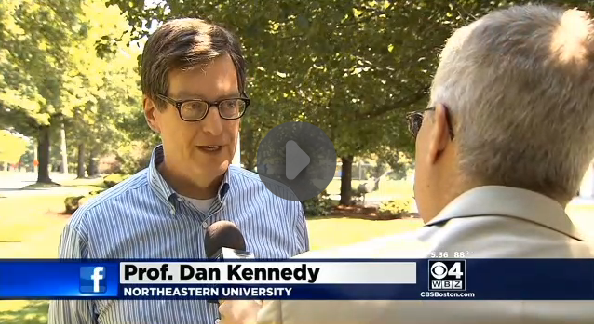Many thanks to old friend Jon Keller of WBZ-TV (Channel 4) for featuring the book that Ellen Clegg and I wrote, “What Works in Community News,” on his Sunday “Keller at Large” program. You can watch our two-part conversation here.
Tag: Jon Keller Page 1 of 6

Joe Rogan. Photo (cc) 2014 by Do512.
This week, on the second “Beat the Press” podcast, we talk about the latest mishegas at CNN, as number-two executive — make that former number-two executive — Allison Gollust walks the plank.
Other topics include a discussion of how much responsibility Spotify should take for Joe Rogan’s vaccine disinformation and n-word-spewing mouth; privacy concerns over the death of comedian Bob Saget; and a conversation with civil-liberties lawyer Harvey Silverglate, the co-founder of FIRE, the Foundation for Individual Rights in Education.
Plus: Rants & Raves are back!
Hosted, as always, by Emily Rooney, with Jon Keller, Lylah Alphonse and me. You can listen to “Beat the Press” on Apple and wherever fine podcasts are found.
 As an alumnus of “Beat the Press,” which was canceled over the summer, I’ve been curious about what GBH-TV (Channel 2) would do about filling the Friday 7 p.m. time slot.
As an alumnus of “Beat the Press,” which was canceled over the summer, I’ve been curious about what GBH-TV (Channel 2) would do about filling the Friday 7 p.m. time slot.
The station ran a local politics show during the fall that was supposed to end on Election Day but was instead extended through the rest of the year. Now it looks like that show is being made permanent, with a new name — “Talking Politics.” The show will be focused on the suddenly hot Massachusetts gubernatorial race.
Although I don’t know whether it’s deliberate (I suspect it was), the name conjures up the connections between GBH News and the late, great Boston Phoenix. The host, Adam Reilly, used to be the Phoenix’s “Talking Politics” columnist. GBH News senior editor Peter Kadzis, who’ll be part of the new show, was the editor of the Phoenix for many years.
Other Phoenix alums associated with GBH News include former “Talking Politics” columnists Jon Keller and David Bernstein as well as civil-liberties columnist Harvey Silverglate. And, of course, yours truly. Might we consider renaming my GBH media column “Don’t Quote Me”?
The full press release follows.
BOSTON (December 2, 2021) – GBH News today announced the launch of Talking Politics, a new weekly show that will take a deep dive into local politics, with a special focus on the 2022 Massachusetts gubernatorial race. Hosted by GBH News politics reporter Adam Reilly, the panel-based series will feature conversations with local political newsmakers, influencers, analysts and activists. GBH News City Hall reporter Saraya Wintersmith, Statehouse Bureau reporter Mike Deehan and politics editor Peter Kadzis will also be key contributors. Talking Politics debuts on Friday, December 3 at 7:00 p.m. on GBH 2 and streaming on the GBH News YouTube Channel.
“Audiences throughout Massachusetts know that the issues being debated on Beacon Hill have the potential to directly impact their lives. And it’s not just the issues, but the individuals who are shaping these discussions,” said Pam Johnston, general manager of news at GBH. “With this week’s announcement from Governor Baker that he will not seek reelection, the race to lead Massachusetts is wide open. Talking Politics will bring audiences compelling conversations and deeply reported local journalism about political issues across the Commonwealth with the 2022 gubernatorial race at center stage.”
Talking Politics builds on the foundation created by Boston’s Race Into History, the pop-up television show integral to GBH News’ multi-platform initiative focused on the 2021 Boston Mayoral Race. In each week’s half-hour episode, Talking Politics will take a broader look at state and local politics and their impact on the issues that matter. The series will investigate a wide range of political developments across the Commonwealth including the unfolding gubernatorial race, the new leadership in place in key Massachusetts cities, and the administration of Boston Mayor Michelle Wu.
The debut episode will look at Massachusetts Gov. Charlie Baker’s decision to not seek reelection in 2022 after leading the Commonwealth for two terms. Host Adam Reilly and guests will also provide an update into the campaigns of the race’s declared candidates, Republican Geoff Diehl, and Democrats Danielle Allen, Ben Downing, and Sonia Chang-Díaz.
Audiences can stay up-to-date with local political coverage by subscribing to the GBH News politics newsletter. GBH News has been expanding its political coverage over the past year including a multi-platform journalism initiative focused on Boston’s mayoral race and regular appearances by elected officials on Boston Public Radio.
Previously published at WGBHNews.org.
Two key moments bookended Tuesday night’s U.S. Senate debate between Democratic incumbent Ed Markey and his primary challenger, U.S. Rep. Joe Kennedy III. We probably won’t know for a few days whether either of those moments will matter. But with early voting under way and polls showing the race to be up for grabs, any edge could make a difference.
The first moment came early, when Kennedy brought up recent reports that the parents of Danroy “DJ” Henry Jr. had accused Markey of acting indifferently — even using the term “colored” — at a meeting over the 2010 killing of their son by a white police officer.
“You did nothing,” Kennedy said. “I have stood by that family for year after year through thick and thin.”
Presumably Markey, who has apologized to the Henry family, knew the matter would come up. But he seemed flat-footed, asserting over and over that he, Kennedy and Sen. Elizabeth Warren had all worked together to draft letters demanding an investigation by the U.S. Justice Department.
“When Congressman Kennedy says I did nothing, he knows it’s not true,” Markey said. “He knows it is a falsehood.”
But that merely created an opening for Kennedy, who retorted: “Let’s be very clear. It’s not my words that said you did nothing. It’s Mr. Henry’s words that said you did nothing.” Score one round for Kennedy on the crucial issue of racial justice.
The second moment came later. Markey complained that Kennedy’s twin brother, Matthew, is running a Super PAC — a campaign fund not directly affiliated with a candidate — that has been responsible for multiple attack ads against Markey.
Markey then speculated that Kennedy’s father, former congressman Joe Kennedy II, was helping to fund the Super PAC with money from fossil-fuel companies with which he’d done business.
“Is your father funding that Super PAC that is attacking me right now?” asked Markey.
“No clue, no idea,” Kennedy responded. He quickly tried to change the subject, pointing out that it was Markey who declined to sign a “People’s Pledge” keeping undisclosed outside money out of the campaign.
Markey lowered the boom: “I’m sure your father is watching right now. Tell your father right now that you don’t want his money to go into a Super PAC that runs negative ads.” As several people pointed out on Twitter, it might have been illegal for Kennedy to do as Markey had demanded, since candidates are forbidden from coordinating with Super PACs. Nevertheless, it was an effective bit of political theater.
And then Kennedy went too far, accusing Markey supporters of pushing social-media posts referencing Lee Harvey Oswald, the man who assassinated John F. Kennedy. Markey seemed genuinely offended at the accusation that toxic internet trolls were somehow tied to his campaign.
““No one affiliated with my campaign would ever say anything like that,” Markey said, dropping his voice. He added that it was “completely unacceptable.”
The debate, broadcast on WBZ-TV (Channel 4) and moderated by political analyst Jon Keller, was freewheeling, although much of it focused on small issues and even smaller differences between the two candidates.
With both candidates espousing progressive agendas, the campaign has come down to Markey’s legislative record, compiled during more than four decades in office, versus Kennedy’s contention that he would lead the fight for the values they share across the country.
“I have more than 500 laws on the books that have been signed by presidents,” Markey said. “That is what I do.”
Responded Kennedy: “The difference is: he’ll vote for it, I’ll fight for it.”
One particularly hot potato Keller dropped in their laps was a question about whether they would endorse a candidate of color next year against Boston Mayor Marty Walsh. It was an opportune moment, Keller said — not only is racial equity an issue that has risen to the top of the national agenda, but Democratic presidential candidate Joe Biden had just chosen U.S. Sen. Kamala Harris, a Black woman, as his running mate. But both men left the tin foil on the spud and tossed it harmlessly away.
“It’s impossible to predict the future. It just is,” Markey said. “You’re asking a hypothetical. Mayor Walsh is doing a good job.” Kennedy added, “Mayor Walsh certainly deserves a chance to make his case.”
The last day of voting (what we used to call primary day) is Tuesday, Sept. 1. Two Republicans are also seeking the Senate seat: Shiva Ayyadurai, a technology entrepreneur, and Kevin O’Connor, a lawyer. The Democratic and Republican nominees will face off to determine the winner on Nov. 3.
Thanks to Jon Keller for having me on “Keller @ Large” Sunday morning to talk about “The Return of the Moguls.” We’re having a launch party at Northeastern today at 5 p.m. Hope to see you there!
There’s a context for the racial taunts directed at Orioles centerfielder Adam Jones at Fenway Park during Monday night’s game. After all, we had just learned that a Trump supporter from Winchester, one of the wealthiest communities in the state, had written a letter to his community weekly complaining about those “Hate Has No Home Here” signs that have popped up here and there (including in front of our house).
“It is offensive to imply that the rest of us — who don’t have a sign and who don’t think the way you think we should — are haters,” wrote John Natale in the Winchester Star. “That’s insulting.” It was a breathtaking display of cluelessness and insensitivity. And we never would have heard about it if a seventh-grader’s righteous response hadn’t gone viral.
There has been an enormous amount of commentary about the Fenway Park incident in the past few days. Here are three you ought to take a look at.
- In The Boston Globe (owned by Red Sox principal owner John Henry), columnist Adrian Walker wonders why more steps haven’t been taken to curb racist fans. “Bad behavior can be stopped,” writes Walker. Indeed. As we have been reminded, Boston is one of the most inhospitable cities in the country for visiting black players. It’s disgusting. I’m glad that fans gave Jones a standing ovation Tuesday night, but it shouldn’t have been necessary in the first place.
- In the Boston Herald, sports columnist Steve Buckley gives Red Sox president Sam Kennedy high marks for acting decisively but criticizes him for blaming the problem on “an ignorant few.” Buckley’s response: “Every time the ignorant few do their handiwork, another episode of ‘Boston is a Racist City’ gets played out on the national stage.” It may be an ignorant few who drunkenly spew the N-word in public, but something is making them feel empowered to do it.
- At WBZ Radio (1030 AM), Jon Keller draws a distinction between “real Bostonians” and “fake Bostonians.” The trouble is, though real Bostonians would never engage in racist taunting, they’re not doing enough to stop it, either. Says Keller: “Time for the real Bostonians to do more to see to it that the fakers are exposed, isolated and shamed.”
Jon Keller of WBZ-TV (Channel 4) and I talked Monday about Facebook’s experiment in surreptitiously changing the emotional content in the newsfeed of some of its users to see if it made them happy or sad.
Author and Microsoft Jaron Larnier weighs in on The New York Times’ opinion pages today, writing:
The manipulation of emotion is no small thing. An estimated 60 percent of suicides are preceded by a mood disorder. Even mild depression has been shown to increase the risk of heart failure by 5 percent; moderate to severe depression increases it by 40 percent.
And if you want to get up to speed quickly, Mathew Ingram of GigaOm has written a terrific all-known-facts round-up.
This is an important issue, and it should not sink beneath a morass of outrage about other issues — although, sadly, it probably will.







Happy news breaks out at Media Nation
By Dan Kennedy
On January 28, 2015
In Media
Tighter editing standards at Boston.com, improved online comments at the Boston Herald and well-deserved recognition for some first-rate political reporters. There’s so much good news on the local media front on this day-after-the-blizzard morning that it’s hard to know where to begin.
• Boston.com strives for civility. After a miserable stretch in which it falsely accused a Harvard Business School professor (and, gulp, lawyer) of sending a racist email to one of the owners of a Chinese restaurant and then mocked House Speaker John Boehner’s alleged drinking problem following an assassination threat, the folks at Boston.com sound determined to get it right.
In an interview with Benjamin Mullin at Poynter.org, Boston.com general manager Corey Gottlieb says he’s beefed up copy-editing and tightened standards in response to the two incidents. He tells Mullin:
The worst thing the Boston Globe-affiliated site could do is chase clicks. December turned out to be a boffo month for Boston.com, driven by its reporting on the Harvard professor’s harassment of the Chinese restaurant over a $4 overcharge — a righteous hit before it went off the rails. (T-shirts were involved, too.) According to Compete.com, Boston.com received nearly 3.7 million unique visits in December, way up from November’s 2.8 million. Compete’s numbers aren’t perfect by any means, but it’s safe to say Boston.com’s numbers were up a lot.
Yet quality matters. And according to Compete, BostonGlobe.com actually attracted more traffic than its free cousin in December, receiving more than 3.8 million unique visits — even though you have to pay a digital subscription fee to receive full access to the site (granted, free social sharing at BostonGlobe.com is pretty generous these days).
No doubt Gottlieb and company are going to stick with their plan to build a buzzy site with lots of viral content (here’s my alternative idea). But I’m glad to see that they understand what’s gone wrong and that they’re determined to do something about it.
One of Boston.com’s biggest problems is that it’s been flying without an editor (except for a few weeks last fall) since its relaunch last spring. That should be rectified as soon as possible.
• The Herald embraces Facebook. Online newspaper comments in general can make you despair for humanity. Over the years the Herald’s have been particularly loathsome. So kudos to publisher Pat Purcell and editor Joe Sciacca for switching to a Facebook-based commenting system.
Facebook isn’t perfect. Certainly there are issues with a news organization turning over its community platform to a giant corporation with its own agenda and priorities. But people are generally more civil and constructive when they’re on Facebook, in large measure because Facebook requires real names — and most people comply.
Check out the comments beneath Howie Carr’s ridiculous column on climate change today. Not bad at all. Only one of the first eight is pseudonymous. And if they’re not all exactly civil, they are less toxic than I’m accustomed to seeing at BostonHerald.com.
Can a real-names policy at BostonGlobe.com be far behind?
• Massachusetts’ best political reporters. Chris Cillizza, who runs a political blog for The Washington Post called The Fix, has named nine Massachusetts political reporters as among the best in the country. (Disclosure: The list was based in part on a reader poll, and I voted for friend of Media Nation Jon Keller, who’s among the winners — but every one of these is worthy.)
It’s especially nice to see a couple of reporters outside the Greater Boston orbit win recognition — Jim Hand of Attleboro’s Sun Chronicle and Shira Schoenberg of The Republican in Springfield. Congratulations to all.